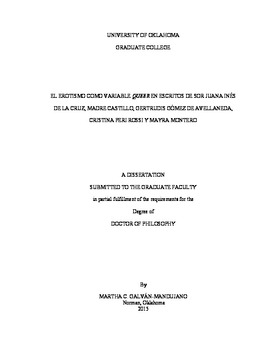| dc.contributor.advisor | Wray, Grady C. | |
| dc.contributor.author | Galvan-Mandujano, Martha C. | |
| dc.date.accessioned | 2015-05-13T13:25:50Z | |
| dc.date.available | 2015-05-13T13:25:50Z | |
| dc.date.issued | 2015-05-08 | |
| dc.identifier.uri | https://hdl.handle.net/11244/14614 | |
| dc.description.abstract | This dissertation uses contemporary queer theory to analyze women's writings from the XVIIth to the XXIst century. Queer theory opens a space for analysis that covers a variety of genres, characters, and topics. Women writers from these distinct periods were able to find a space in the literary field and present atypical topics; they went against the established norms and criticized restrictive practices. Although some of them suffered negative criticism, abuse by their confessors, estrangement, rejection and exile, they were able to leave a legacy for other women and male writers as well. They manifested their discontent and dissidence and confronted questions of sexuality, gender, and desire. Thus the main goal in this work is to analyze specific Latin-American women writers from the XVIIth to the XXIst century who broke with the paradigms of the heteronormative societies of their respective eras. | en_US |
| dc.language | es | en_US |
| dc.subject | Latin American, Women, Writers, queer, | en_US |
| dc.title | EL EROTISMO COMO VARIABLE QUEER EN ESCRITOS DE SOR JUANA INÉS DE LA CRUZ, MADRE CASTILLO, GERTRUDIS GÓMEZ DE AVELLANEDA, CRISTINA PERI ROSSI Y MAYRA MONTERO | en_US |
| dc.contributor.committeeMember | Rodriguez, Clemencia | |
| dc.contributor.committeeMember | LaGreca, Nancy | |
| dc.contributor.committeeMember | Boggs, Bruce A. | |
| dc.contributor.committeeMember | Colín, José Juan | |
| dc.date.manuscript | 2015-05-07 | |
| dc.thesis.degree | Ph.D. | en_US |
| ou.group | College of Arts and Sciences | en_US |
| shareok.nativefileaccess | restricted | en_US |
